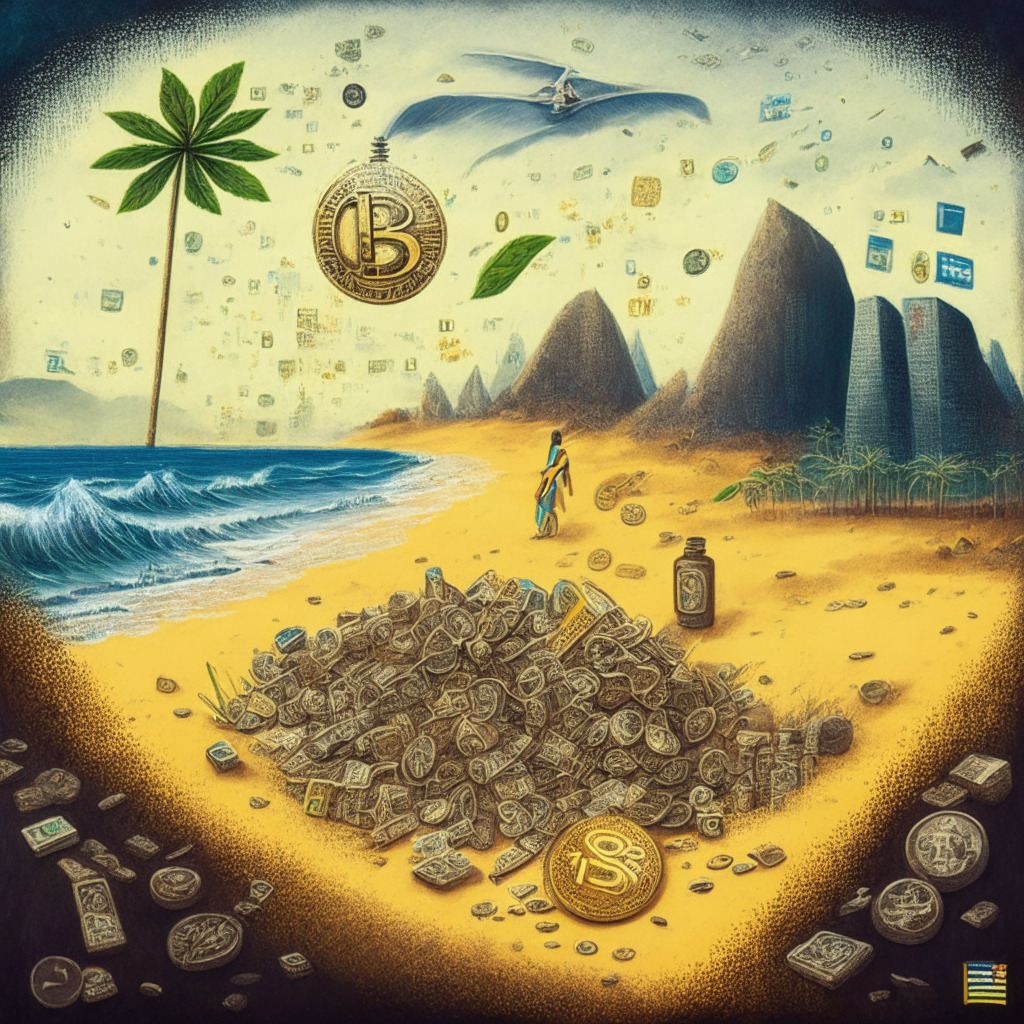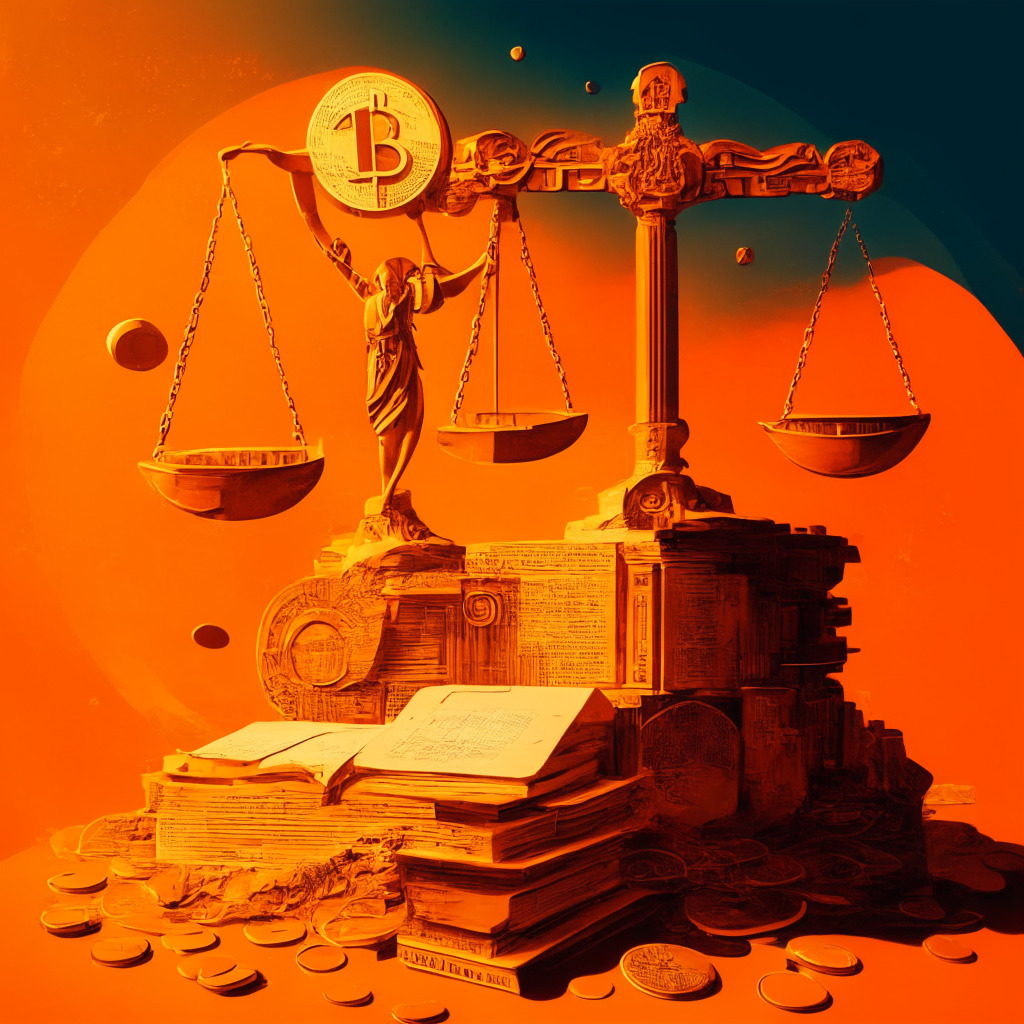Digital asset infrastructure provider Taurus integrates with Polygon blockchain, enabling clients to issue digital securities. With tokenization gaining popularity, Taurus draws interest from major banks like Credit Suisse and Deutsche Bank, blending traditional finance with innovative Web3 solutions.
Search Results for: Tokenization
Tokenization Revolution: Taurus, Polygon & the Future of Mainstream Finance
The partnership between Swiss digital asset infrastructure provider Taurus and Ethereum scaling network Polygon highlights the growing traction of blockchain technology and tokenization within mainstream finance. With numerous financial institutions seeking blockchain-agnostic and token-agnostic infrastructure, the landscape will continue to evolve, attracting players from various sectors and revolutionizing asset management solutions while addressing security, scalability, and compliance concerns.
Tokenization Trend Booms: $220M Market Cap, DeFi Integration, and Regulatory Challenges
Tokenization of financial securities on the blockchain is gaining momentum, with a market cap of over $220 million. Firms like Matrixport, Backed Finance, Ondo, and Franklin Templeton create tokenized government bonds and ETFs, predominantly on Ethereum. This trend enables new opportunities, improved lending efficiency, and promises innovation in finance; however, it requires a supportive regulatory landscape to reach its potential.
Ripple Acquires Metaco for $250M: A Bold Move in Asset Tokenization Amid SEC Battle
Ripple acquires Switzerland-based blockchain firm Metaco for $250 million, marking its entry into the asset tokenization field. This aims to expand Ripple’s enterprise offerings and reach in the international market, providing customers access to advanced technology for custody, issuance, and settlement of tokenized assets.
COFRA Joins Hedera Governing Council: Tokenization and Supply Chain Innovations Ahead
The Hedera Governing Council has added COFRA, a 182-year-old family business, as its 30th member. Focused on developing innovative blockchain-based solutions, COFRA plans to use Hedera’s Token Service for tokenization and enhancing supply chain transparency within their organization.
Ripple Acquires Metaco for $250M: Exploring Future of Tokenization and Institutional Adoption
Ripple acquires Swiss digital asset custody company Metaco for $250 million, aiming to expand institutional offerings and equip customers with technology to custody, issue, and settle tokenized assets. The partnership anticipates accelerated growth and stronger market impact in the evolving world of tokenization.
BNY Mellon’s Bold Move: Embracing Blockchain, Tokenization, and Digital Assets in Banking
BNY Mellon takes significant strides towards digital assets, focusing on custody and clearing services, implementing blockchain to modernize infrastructure, and exploring tokenization for democratizing investments. Emphasizing long-term vision and risk management, the bank aims to expand its offerings and adapt to emerging technologies.
Navigating the Crypto Regulatory Landscape: Embracing Innovation or Stalling Progress in Brazil?
Brazil’s Comissão de Valores Mobiliários (CVM) has announced plans to initiate a second regulatory sandbox focusing on tokenization, set to start in 2024. The sandbox will allow companies to test products or ideas under relaxed regulations, potentially in sectors like agribusiness and Environmental, Social, and Governance.
Unmasking Shadows: Blockchain’s Flashy Evolution Amidst Ethical Challenges and Regulatory Needs
This article discusses the complex landscape of blockchain technology. It highlights misuse of power in crypto markets, efforts to foster secure trading conditions, potential tokenization of debt securities, the implication of decentralized prediction markets, and calls for comprehensive regulation and ethical self-governance in the crypto field.
Unraveling the XRP Conundrum: Court Wins, Regulatory Success, and Investor Dilemma
“In the financial market fluctuations, XRP’s recent price movements have caught attention. A U.S. Judge’s favorable decision caused a price surge, but a decrease afterwards hinted at potential lack of investor confidence. Additionally, Ripple’s Asia Pacific subsidiary now has a Major Payment Institution license for digital payment tokens in Singapore, contributing to further operational expansion.”
UBS Asset Management Takes Leap with Blockchain: Tokenized VCC Fund on Ethereum Unveiled
Switzerland’s UBS bank is making strides in the blockchain industry, launching its first ever pilot tokenizing a fund on the Ethereum blockchain. This initiative, a component of Project Guardian, aims to tokenize real-world assets and widen market accessibility for investors. UBS’s revolutionary tokenized service promises to shape the digital asset space and potential future adoption of blockchain technology.
Brazil’s Blockchain Revolution: Tokenizing National Identity with Cause and Concern
Brazil is planning to tokenize the identities of over 214 million citizens through digital documents, using blockchain technology. This initiative, aiming for complete coverage by November 6, promises enhanced security against fraud and improved inter-government collaboration and service accessibility.
Blockchain Revolution in Brazil: National ID & the Prospects and Predicaments of Drex
Brazil plans to incorporate a blockchain-based system for identity verification across three states, with potential to combat crime, streamline services, and protect individual data. However, concerns remain regarding the balance of enhanced security and potential misuse risks.
Exploring Georgia’s CBDC Initiative: Promises, Concerns and the Future of Digital Currency
The National Bank of Georgia (NBG) is intensifying its efforts on a digital lari central bank digital currency (CBDC) and conducting a live pilot project involving nine firms including Ripple Labs. The envisioned CBDC design includes features like programmable money, asset tokenization, agricultural insurance provision, and real estate transaction automation. Despite potential concerns around monetary freedom, the project symbolizes the promising future of blockchain technology.
Scaling the Regulatory Walls: Challenges and Solutions for Digital Asset Markets
The World Federation of Exchanges (WFE) proposed six measures to ensure the safety and sustainability of digital asset markets. These include clear segregation of market infrastructure functions and establishing systems to manage user risks. The WFE also emphasized the need for crypto exchanges to demonstrate full backing of user assets and be sufficiently regulated.
PayPal’s NFT Venture: A Bold Leap into Blockchain or a Risk to Decentralization?
“PayPal’s recent patent application for a non-fungible token (NFT) purchase and transfer system boldy underscores the mainstream acceptance of blockchain technology. The filing suggests designs to leverage NFTs for tokenization, far beyond digital collectibles. However, it also proposes off-chain transactions potentially diverging from the philosophy of complete decentralization that attracted enthusiasts to blockchain technology.”
Europe’s Rising Role in Driving Institutional Cryptocurrency Adoption: A Regulatory Perspective
The recent Blockchain Expo in Amsterdam highlighted Europe as the key driver for institutional cryptocurrency adoption due to its favorable regulatory climate. The European Union’s Markets in Crypto-Assets (MiCA) regulation is implicated as a safety net, offering a regulatory framework for the emerging sector and ensuring user protection, which are lacking in countries like the United States.
Cross-Border Crypto Trading Evolution: Success of Project Mariana and What it Means for wCBDCs
“Project Mariana, a collaboration between the Bank for International Settlements and the central banks of France, Singapore, and Switzerland, has successfully tested a system leveraging cryptocurrency concepts and DeFi technology for seamless cross-border trading in wholesale Central Bank Digital Currencies (wCBDCs).”
Surging Success of Coinbase’s DeFi Network Base: A Flash in the Pan or Future Heavyweight?
Coinbase’s layer-2 network, Base, has surpassed Solana in total value locked (TVL), with a significant 97.21% surge. This increase is majorly driven by decentralized exchange Aerodrome Finance and decentralized social media app Friend.tech. With legislative changes and regulatory scrutiny in play, Base’s future prominence in the crypto world remains uncertain.
Unleashing the Potential and Pitfalls of Chainlink’s Entry into Ethereum Layer 2
Chainlink’s entry into Ethereum layer 2, Arbitrum, will facilitate cross-chain DApp development, aiding high-throughput, cost-efficient scaling. The addition of Chainlink’s Cross-Chain Interoperability Protocol (CCIP) on Arbitrum One should unlock various use cases like cross-chain tokenization and blockchain gaming.
Navigating the Choppy Waters of Bitcoin Amidst Market Pulls and Tugs
“Bitcoin’s price faced a slight disruption due to fears around crypto exchange FTX offloading their digital treasures. However, market-defining announcements like Franklin Templeton’s bid to list a spot BTC ETF and Deutsche Bank’s foray into digital assets may cushion any drastic price falls. Regrettably, altcoins like Apecoin struggle to keep pace with Bitcoin’s resilience.”
Insured Cryptocurrency Staking: A Game-changer or A Potential Risk?
“Boerse Stuttgart Digital, an arm of Stuttgart Stock Exchange, plans to launch an insured cryptocurrency staking service, addressing risk mitigation for potential investors. This development symbolizes the merging of traditional financial services and digital assets, potentially leading to a future where both integrate seamlessly.”
Riding the Bull and Bear Market: Crypto Rebounds Amid Regulatory Challenges
“The digital era brought advancements including the surging value of Bitcoin and other altcoins. Despite potential leverage liquidations for altcoins like Solana’s SOL, coins like Bitcoin Cash, Maker DAO’s MKR, and Ether are on the rise. Important influences on the market include regulatory oversight, legal challenges, and increasing participation from traditional financial institutions.”
ANZ’s Leap into Crypto with A$DC: Groundbreaking Future or Controlled Volatility?
ANZ, a leading Australian bank, recently successfully executed a test transaction for A$DC, its bank-issued stablecoin, on Chainlink’s CCIP. This move shows the potential of blockchain technology in transforming the banking industry and reflects the tension among financial institutions over customer exposure to digital currencies.
Deutsche Bank’s Foray into Crypto: Assured Safety or Regulatory Nightmare?
“Deutsche Bank has partnered with crypto safekeeping specialist, Taurus to establish digital asset custody and tokenization services. They have lodged for a crypto custody license from Germany’s financial regulator, indicative of digital asset custody plans for early 2021. This partnership signals the rising potential of tokenized financial assets.”
Deutsche Bank’s Crypto Custody: Innovative Progress or Risky Move?
“Deutsche Bank has partnered with cryptocurrency platform, Taurus, aiming to offer cryptocurrency custody to its customers. Taurus will provide custody and tokenization technology compliant with local regulations. Despite its forward-thinking approach, the volatile nature of crypto markets presents a financial risk.”
Regulatory Scrutiny vs Technological Advancements: Navigating the Complex Crypto Landscape
Despite regulatory challenges and hacking threats, the crypto sphere continues to innovate, with enhanced privacy, user experience, and transaction efficiency. As Ethereum plans a major transformation and Ripple maintains its legal standing, the tokenized assets market could reach $16 billion by 2030. However, effective regulation remains vital to safeguard all stakeholders.
Straddling Digital and Traditional Finance: Zodia Custody’s Expansion and the Regulatory Dance
“Zodia Custody, a subsidiary of Standard Chartered, now offers digital asset custody services in Singapore, anticipating growing investment as regulations evolve. This move, along with its current registrations in U.K., Ireland, Luxembourg, and a pending application in Japan, signifies its global ambitions in the cryptocurrency sphere. Balancing regulatory respect, innovation, and stakeholder interests is crucial.”
Stellar’s XLM Experiences Anomalous Surge Amid Potential Announcements and Speculation
“Stellar’s native token, XLM, saw a remarkable 11.5% increase in value within a week, contradicting Bitcoin’s and most altcoins’ downtrends. Stellar Org hinted at an important event on September 12, generating intrigue. Still, speculations surrounding Elon Musk’s possible integration of XLM into social network X are baseless. Meanwhile, Stellar Development Foundation has invested in MoneyGram International.”
Navigating the Tightrope: Federal Oversight and the Future of Blockchain Technology
Vice Chairman of the Federal Reserve, Michael Barr, in a fintech event, emphasized the need for regulatory oversight in the swift adoption of blockchain technology. He discussed the basic research into Central Bank Digital Currency (CBDC), potential for stablecoin legislation, and the significance of balancing innovation with potential risks.
Navigating the Global Ambitions of Coinbase: Expansion, Investments, and Hurdles Ahead
“Coinbase’s ‘Go Broad, Go Deep’ global expansion includes acquiring licenses and enhancing market presence in regulatory clear countries like Europe, Canada, Brazil, Singapore, and Australia. It added six new projects to its Base Ecosystem Fund while cryptocurrency startup LBRY battles a legal charge brought by the SEC.”
South Korea’s Mirae Asset Securities Collabs with Polygon Labs to Tokenize Assets: Will this Disrupt the Traditional Financial Landscape?
Mirae Asset Securities collaborates with Polygon Labs to facilitate tokenization and Web3 integration with traditional finance. This alliance aims to create an infrastructure for issuing and transacting tokenized securities – translating tangible assets into blockchain-backed cryptographic tokens. The partnership anticipates reshaping capital markets by eliminating intermediaries, promising a more efficient, transparent, and inclusive global financial system.































